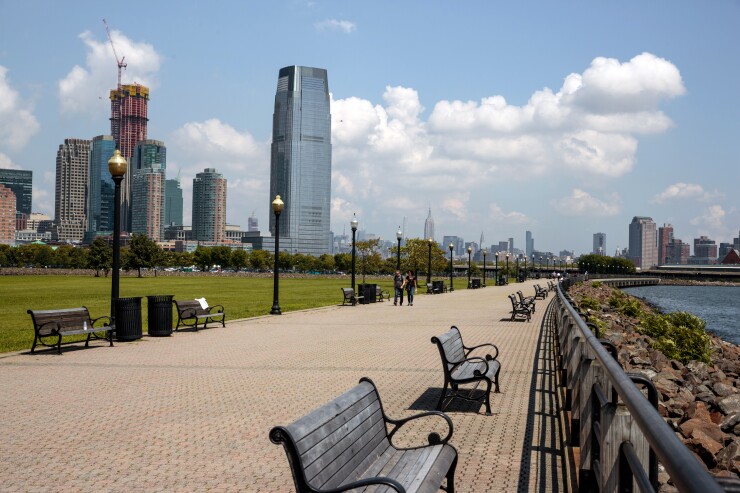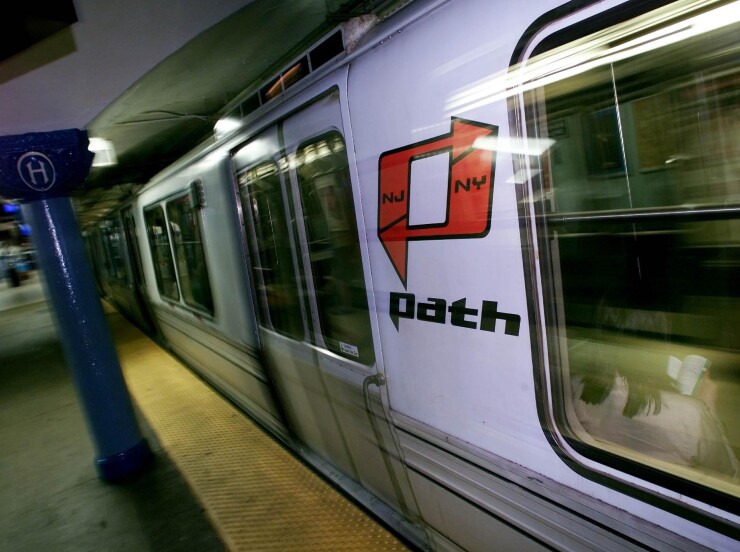Jersey City has settled a financial dispute with the Port Authority of New York and New Jersey, positioning the Garden State’s second-most-populous city for continued economic momentum.
The city, a short train ride across the Hudson River from Manhattan, filed a more than $400 million federal lawsuit against the Port Authority four years ago claiming the bi-state agency hadn’t delivered on tax agreements for dozens of properties. After disputing the lawsuit’s claims, the Port Authority agreed in March to a preliminary settlement that the city council advanced last month and is slated to approve at its next meeting on Dec. 19.

“This resolution is a big win for our city, bringing a renewed commitment to several important projects,” Jersey City Mayor Steven Fulop said in a statement. “This has been four years of back-and-forth and we are glad it is resolved.”
The
The Port Authority has additionally agreed to a 70% increase in annual payments in lieu of taxes to Jersey City for several properties that will bring in $16 million over a 10-year period. The Port Authority will also pay the city $1 million annually for an office building the agency operates in downtown Jersey City and $4.8 million in PILOT payments for that property and two other parcels, to cover the period when the lawsuit was pending.
Under another provision the Port Authority agreed to turn over a 110-year old Powerhouse warehouse, creating further economic development opportunities. The agency and city agreed to split the revenue equally from whatever redevelopment sprouts up at the downtown site.
“These agreements represent a new chapter in our relationship with Jersey City, bringing greater stability and certainty between the Port Authority and one its most valued local partners,” Port Authority chairman Kevin O’Toole said in a statement after the board of commissioners approved the settlement terms in March. “This is an important step forward for our agency that will mean better service to PATH customers for generations to come.”
Mayor Fulop first filed suit against the Port Authority in 2014 claiming that the city was losing out on an estimated $318 million in additional tax revenue including $18 million per year. The Port Authority owns 40 properties throughout the city. In early 2015 U.S. District Judge Susan Wigenton denied the authority's motion to dismiss the lawsuit.
“The city itself in years past entered into certain agreements with the Port Authority that locked in payments in lieu of taxes in perpetuity,” said Victor Afanador, an attorney with Lite DePalma Greenberg, LLC, a Newark-based law firm that represented Jersey City in the lawsuit, during a
Fulop said boosting Jersey City’s public transportation access through the new PATH stop the Port Authority is exploring is crucial to foster economic growth.
“We know that investing in trains, stations and reliable services will help to remove cars from the street, boost the economy and do so much more to increase the quality of life,” Fulop said. “We look forward to working together with the Port Authority, as they will continue to remain a major force in our community. “

Moody’s Investors Service upgraded Jersey City general obligation bonds one notch to Aa3 from A1 in October 2016 citing the city’s “rapidly growing” and diversified tax base. S&P Global Ratings rates Jersey City debt at AA-minus.
The Port Authority is one of the nation’s largest municipal bond issuers with $24.3 billion of bonded debt outstanding reported in its most recent unaudited
Moody’s analyst Douglas Goldmacher said Jersey City has received a boost in recent years from economic development that has increased tax revenues and PILOT payments. He said the city also benefits financially from its close proximity to Manhattan with many commuters opting to reside there. The city’s population climbed to 270,753, according to the 2017 American Community Survey, from 247,597 in the 2010 U.S. Census.
“The city is growing at a very impressive rate,” said Goldmacher. “They have a very aggressive plan for growing the city even more and we will be watching this closely.”
Goldmacher said the Port Authority settlement will be positive, giving the city access to a “substantial” amount of money and paving the way for future development opportunities. He added that the enhanced transportation access if the new PATH station materializes will create added benefits for continued momentum.
“A strong mass transit connection to New York City is one of Jersey City’s biggest advantages,” said Goldmacher. “They are going strong and have room to grow.”
The city council approved a new 1% payroll tax on Nov. 21 that is estimated to provide $80 million in annual revenue to its cash-strapped school district. The tax derived from state legislation that allows municipalities with populations over 200,000 to impose an employer payroll tax for school districts after another form of school aid was eliminated that would have brought Jersey City public schools $175 million this year.
Goldmacher noted in a Nov. 6 report that Jersey City recently adopted a comprehensive fiscal control policy that includes a fund balance target between 5% and 10% of its budget. The policy also calls for a three-year financial forecast and a detailed plan for budget preparations that involves “adequate oversight” and improved transparency, according to Goldmacher.





